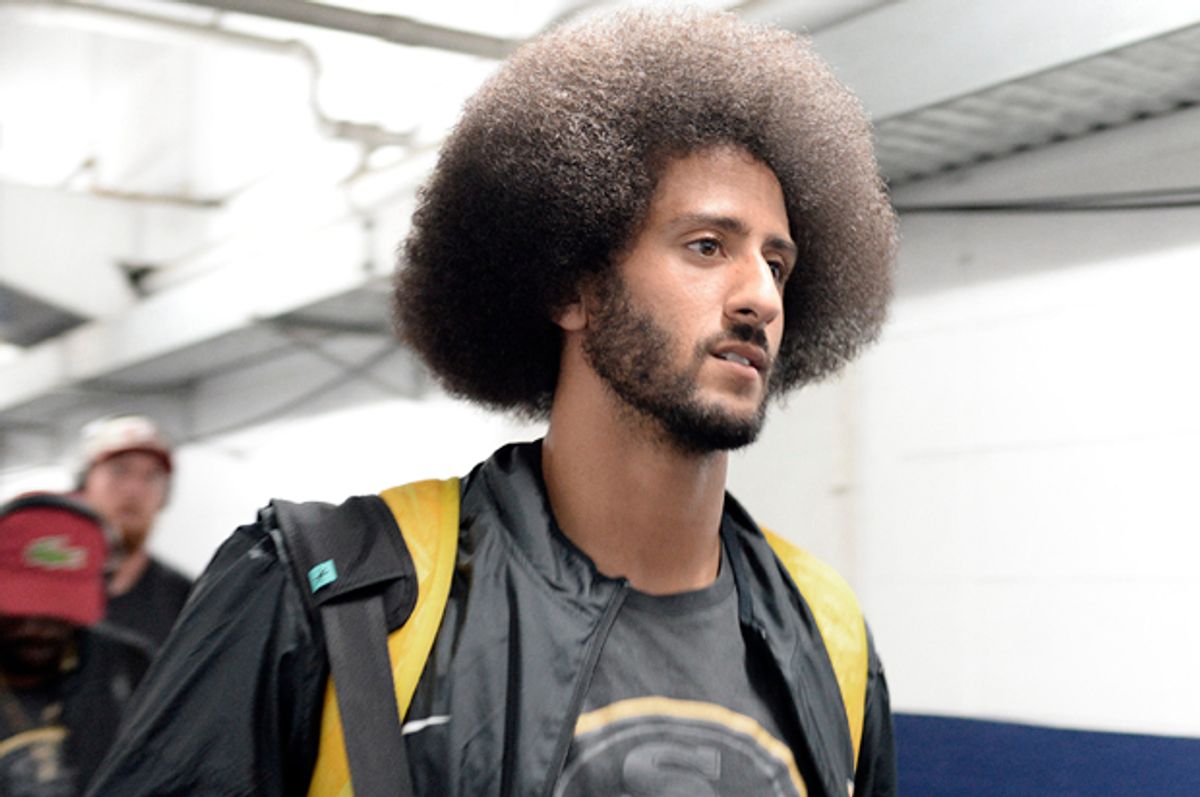“We wonder why our country is in the toilet?!” Thus tweeted former pro baseball player Aubrey Huff, condemning Colin Kaepernick after the San Francisco 49ers quarterback refused to stand during the national anthem at a preseason game last week.
But Huff has it exactly backward. The Kaepernick controversy shows what is truly great about America: our shared commitment to free expression.
Yes, critics across the blogosphere have denounced Kaepernick's conduct as an insult to the nation and its armed forces. They also slammed subsequent comments by Kaepernick, who is biracial, about the experiences of people of color, whom he said are denied “freedom and justice” in the United States.
And they booed Kaepernick at the 49ers' final preseason game on Thursday night against the San Diego Chargers, where he dropped to one knee — instead of remaining seated — when "The Star-Spangled Banner" was played. "You're an American. Act like one," read one sign in the crowd, which was celebrating the Chargers' annual Salute to the Military night.
But almost nobody said that Kaepernick himself should be denied the freedom to protest during the national anthem. Donald Trump suggested that Kaepernick “find a country that works better for him,” but even the voluble Trump didn’t say the quarterback should be penalized for his behavior. Nor did the 49ers, who admitted that Kaepernick was within his rights to remain seated.
“In respecting such American principles as freedom of religion and freedom of expression, we recognize the right of an individual to choose and participate, or not, in our celebration of the national anthem,” the 49ers declared, in a statement.
That’s exactly as it should be in a country that makes such a fuss about freedom. But it’s also easy to forget that until the very recent past, athletes didn't actually possess freedom — at least not when the national anthem was playing.
African-American medal winners Tommie Smith and John Carlos were expelled from the 1968 Olympics in Mexico City for raising their fists in a black power salute during the playing of "The Star-Spangled Banner." Four years later, two black American athletes who turned their backs to the flag during their medal ceremony were kicked out of the Munich Games.
Back home, meanwhile, the National Football League required players to hold their helmets in their left hands and salute the flag with the other one while the national anthem was playing. Pulling what he called “a low-key Tommie Smith,” NFL union organizer and anti-war protester Dave Meggyesy held his helmet in front of him and bowed his head instead.
But that was as far as it went. Angered by players who showed insufficient reverence towards the anthem, the NFL issued further orders barring talking, gum chewing and “shoulder-pad slamming” while it was playing. As recently as 1996, pro basketball player Mahmoud Abdul-Rauf was suspended for refusing to stand during the Star Spangled Banner.
Not surprisingly, student athletes didn’t have the right to protest amid the playing of the national anthem either. In 1970 a football player at a high school in suburban Chicago was suspended by his coach for refusing to remove his helmet during the anthem. But the school principal came to the student’s defense, arguing that the playing of "the Star Spangled Banner" had become an empty ritual.
“People talk while it is being played, eat hot dogs and drink Cokes, visit friends and pay no attention whatsoever to it,” the principal told reporters. “So why bother at all? The only thing the national anthem accomplishes before a sports event is that it helps numb the crowd for a minute or two.”
For the most part, he was right. Bored sportswriters in the 1970s timed the playing of the national anthem at different events, awarding mock prizes to singers and musicians who could get through it the fastest. To this day, bookies and casinos offer wagers on the length of the anthem's playing at big games. It’s a patriotic masquerade, a hollow gesture, a joke.
Until someone protests, that is. Then the song's playing becomes something dead serious, and we learn something important about ourselves. Over the past few days, as the controversy over Colin Kaepernick exploded, we’ve seen how deeply we value individual freedom — even for people whom we might detest.
And if you ever forget that, just think about Feyisa Lilesa. He’s the Ethiopian marathoner who crossed the finish line at the Rio Olympics this summer with his hands above his head in an “X.” That’s a symbol of the Oromo people, Ethiopia’s largest ethnic group, who have been killed and jailed for protesting their government.
“If I go back to Ethiopia, maybe they will kill me,” Lilesa said. “I have not decided yet, but maybe I will move to another country.”
I hope if he can’t go home, Lilesa comes here. Americans can protest whenever we want, even during our patriotic celebrations. And that's something all of us should celebrate, proudly and patriotically, no matter what we think of Colin Kaepernick.



Shares